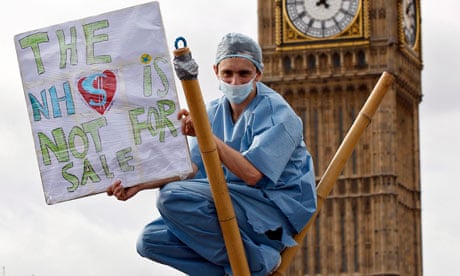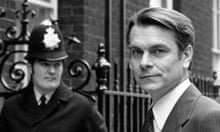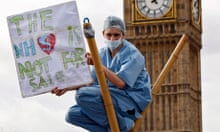Labour has changed tack on health policy, saying it would be willing to co-operate with the government on giving GPs greater commissioning powers, but only if ministers drop the health and social care bill, due to be debated in the Lords this week.
Constitutional historian Lord Hennessy and the former leader of the social democrats Lord Owen are to propose that parts of the bill are referred to a special select committee for long-term scrutiny.
They claim the bill was not given proper scrutiny in the Commons after ministers were forced to delay it, hold a consultation and then reintroduce it.
Their move came as protesters from the anti-cuts campaign UK Uncut closed Westminster Bridge for two hours.
Owen has insisted he is not seeking to block the bill, and would table amendments to ensure that two-thirds of the bill would be examined in the normal way. He has promised the scrutiny process would be completed by the end of February, but government business managers know the bill is likely to be vulnerable since the parliamentary session will end in the spring.
The proposed select committee would focus on issues such as future democratic control of the NHS, the role of the secretary of state and the plans for Monitor, the new NHS regulator.
The concern in the Lords about the bill was underlined when government business managers were required to extend debate on the second reading into a second day because 80 peers wanted to speak.
The NHS confederation, the body that represents managers in the health service, also called on peers to change the bill to clear lines of accountability. They warn the NHS is being "paralysed by fuzzy structures and decision-making processes".
The confederation said it is unconvinced the reforms as currently constructed will deliver a coherent system that will enable the NHS to tackle its most significant challenges. It says the reforms do not directly address the financial pressures and that the jury is out on whether they will improve care for patients.
In his first act as shadow health secretary since his appointment last week, Labour's Andy Burnham said he was happy to see GPs given greater power to commission services, describing his appointment as a fresh start for Labour on the NHS.
He said: "It's quite clear that the health secretary has failed to establish a consensus in the country behind his reforms.
"My message to him is please, stop digging in. The more he digs in, the more he is putting our National Health Service in the danger zone. This is a genuine offer that I am making to him – drop your bill and we will work with you constructively to reform NHS commissioning.
"That was the aim that was at the heart of the bill. Let's just focus on that, stick with that and you will have our support in reforming NHS commissioning. But this bill goes far, far wider.
"It basically turns our wonderful NHS into a free market and we will not have that."
The NHS needed "clarity and certainty" but had been left "demoralised and destabilised" by the reforms, Burnham said.
"We did reforms when we were in government to put doctors and nurses more in the lead and we are prepared to go further and help the health secretary on that, but we are not prepared to accept this bill and I think the House of Lords, as we are seeing, has major reservations about it."
More than 2,000 people staged a sit-down protest on Westminster Bridge on Sunday to protest about the bill. The bridge, normally one of London's busiest, links St Thomas's hospital on the southern bank with the Houses of Parliament.
As Big Ben struck 1pm, protesters unfurled banners and sat down, blocking the bridge in both directions as hundreds of police looked on.
UK Uncut, the anti-cuts group which organised the Block the Bridge, Block the Bill demonstration, said: "Today has brought together doctors, nurses, parents, students, unions, pensioners and children together in an unprecedented act of mass civil disobedience.
"We are occupying the bridge because the bill would be bad for the NHS, bad for patients and bad for society."
The protest drew support from people across the UK. Janet Bennett, a pensioner who had travelled down from Liverpool said: "The NHS is so important to people in this country and we need to stand up and protect it from this creeping privatisation, and this is why I am here today."
Susan Secher, 53, a human resources manager from London, said: "Our greatest fear is the NHS will end up as an insurance-based, two or three-tier system … the bill is being pushed through and this is our last chance to stop it."
Just after 2pm, protesters dressed up as medics unfurled a banner over the side of the bridge reading "Save our NHS".
Sam, a therapy radiographer from London, said: "The NHS is the greatest invention in this country's history, providing universal healthcare for all. If it is sold … this will no longer be the case."
Margaret Greenwood, 52 from Liverpool said few people – including many politicians – realised the impact the government's plans would have on the NHS.
"It is so radical that a year or two's time we might not have a recognisable NHS. It represents a wholesale privatisation and people will be wondering around asking what happened and 'what do you mean I have to pay?'"
Greenwood, who has been campaigning against the government's plans for the past 18 months, said her 80-year-old mother was being treated for cancer on the NHS.
"She couldn't afford to be treated if it weren't for the NHS. We can't afford to stand by and let it be dismantled because in the end it is the most vulnerable who will suffer."
Later protesters held a "general assembly" in the middle of the bridge, similar to those organised by campaigners on Wall Street, where they discussed future demonstrations against the government's cuts.



